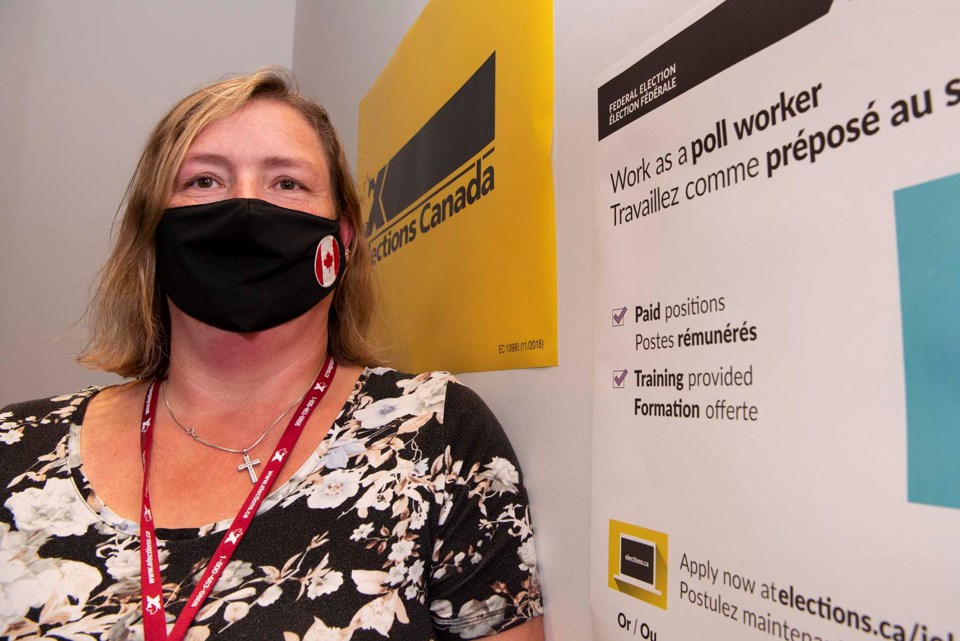Tammy Ward could use your help to set up for this year’s federal election.
The veteran poll worker is one of the thousands of Elections Canada employees in St. Albert running the polls for the 2021 federal election Sept. 20, and she was busy, busy, busy when The Gazette spoke with her Sept. 1. She was organizing poll locations; training and recruiting workers; ordering ballots; and helping to distribute about a zillion golf pencils.
“I’m working probably about 73 hours a week right now, but that’s not normal,” she said.
This isn't her first electoral rodeo, either — Ward has been working federal, provincial, and municipal elections since Jean Chrétien won his third stint as prime minister in 2000, and keeps coming back for more.
“It was something I started just to get a day away from the kids,” she said, and she has kept doing it long after the kids grew up.
“It’s just something I enjoy, and that I never thought I would.”
How to run an election
Elections Canada hires about 300,000 people to run a federal election, its website reports.
That works out to about 8,000 per riding, said Elections Canada spokesperson Leanne Nyirfa. The St. Albert–Edmonton riding office (which is southwest of the food court in St. Albert Centre) needed another 300 people to work the polls on Election Day as of Sept. 1.
Poll workers take on many tasks during an election, Ward said. Some do office work, setting up polling locations and ordering ballots. Others greet voters, direct them to stations, confirm eligibility, and count ballots.
Poll work this year is more complicated due to new safety measures meant to address the COVID-19 pandemic, she continued. All workers will have to wear masks and offer masks to voters, and ensure stations are stocked with hand sanitizer. They also won’t be seated next to each other. Instead of having one person cross a voter’s name off the list and another handing out ballots, one person will perform both tasks.
Workers will also have to keep stations stocked with scores of one-time-use golf pencils, which have replaced the traditional communal pencils due to the pandemic. Nyirfa said Elections Canada ordered about 16 million small and 3.65 million larger pencils for this election, compared to about 350,000 for the 2019 election.
Poll workers are paid and trained, and do get breaks, Ward said. Still, they should be prepared to put in a 12-hour shift.
“It’s a long day, but it goes by so fast,” she said.
Elections Canada requires poll workers to be Canadian citizens, 16 or older on election day, and to not be involved in partisan political activity. Ward said workers should also be organized and good at dealing with people.
Ward said working at a poll helps you appreciate the secure nature of Canada’s election process, and comes with a great sense of satisfaction.
“You’ve done your job, you’ve provided a service to electors, and you’ve allowed everybody to exercise their right to vote.”
Vote early
St. Albert and Sturgeon County-area residents can cast their votes early at advance polls from 9 a.m. to 9 p.m. Sept. 10 to Sept. 13. Advance polls require you to vote at a specific poll based on your address; check the voter information card you got in the mail or elections.ca for your poll’s location.
You can also vote at any time before 6 p.m. Sept. 14 by asking for a special ballot at your local election office, which for most of St. Albert and Sturgeon is the one in St. Albert Centre.
To vote in the federal election, you must be a Canadian citizen and at least 18 years old on election day (Sept. 20). You must also prove your identity, which can be done by providing one piece of government-issued ID with your photo, name, and address; two pieces of ID from a long list of approved ones; or a person of proven identity assigned to your polling station who can vouch for you.
Questions on how to vote in or work during the election should go to elections.ca or 1-800-463-6868.




